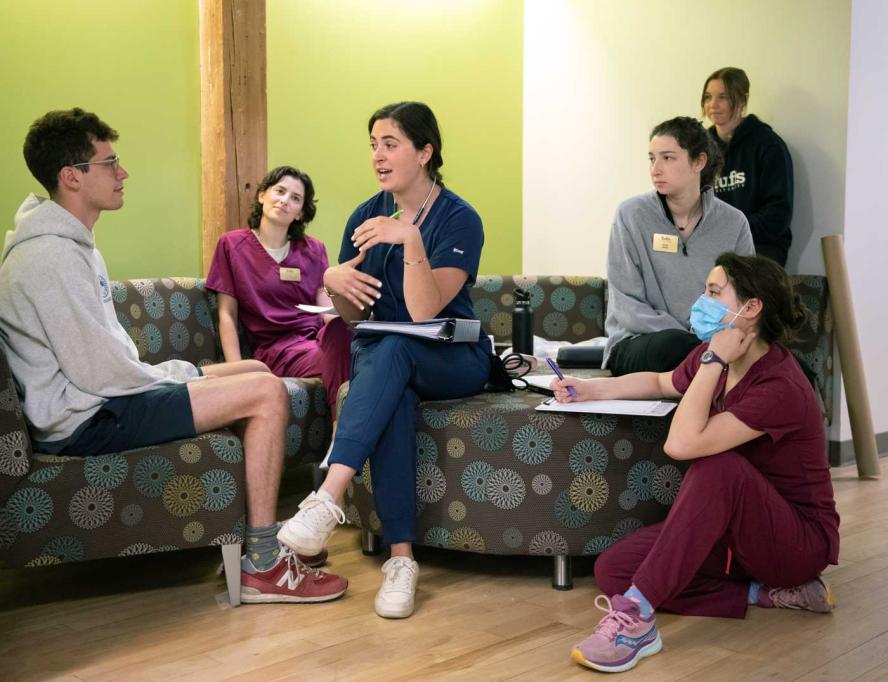Psychosocial Simulation

By: Maisie O'Brien
It takes practice to become a good occupational therapist – one who can establish trust and a rapport with a variety of clients. At Tufts, occupational therapy doctoral students engage in a variety of simulations, including mock sessions with client actors, in order to hone their therapeutic skills.
At the end of their second year in the OTD program, before heading out on their months-long fieldwork placements, students participate in a simulation as part of their required psychosocial course. Taught by Lecturer Heather Gilbert, the psychosocial course is focused on the psychological and social aspects of clients’ lives and care plan.
“In occupational therapy, we consider the whole person when we’re working with a client,” explains Gilbert. “This includes their emotions, cognition, interpersonal relationships, and sense of belonging. These ‘psychosocial factors’ can impact a person’s well-being and ability to function. Everyone has psychosocial needs that must be addressed, and it’s important to consider these factors when working with a client in any branch of OT.”
In the psychosocial simulation, student actors from Tufts’ Department of Theatre, Dance, and Performance Studies assume the identity of a client who has recently been admitted to a hospital. The actors are given brief details about the client’s backstory, including a bipolar disorder diagnosis and withdrawn demeanor, and are asked to improvise additional character traits.
The OT students break up into groups of four and conduct an initial assessment, which is an evaluation to learn as much as possible about a client and their day-to-day life, as well as to establish both long- and short-term goals for their work together. The OT students take turns asking the client questions and build off those of their peers. At the end of the two-hour session, the students document the initial assessment and debrief about the experience together with the client actor and faculty facilitator.
“I was a student in the Tufts MS program and I can tell you firsthand that experiential opportunities, like this simulation, are so helpful for learning,” says Gilbert. “There’s good research on how valuable authentic experiences paired with deep reflection can be, especially as students are getting ready to work with clients in the real world.”
Rachael Gallagher, OTD ’25, participated in the psychosocial simulation last spring and appreciated the opportunity to engage with a client actor. “It was great to practice with a client, and observe my peers and their therapeutic style. We all have our own way of working with clients – from our tone of voice to our word choices to our overall demeanor. It really allowed me to learn from my classmates.”
“Some of my most useful feedback came from the client actor,” Gallagher continued. “I’m normally very upbeat and bubbly, so I approached him in an engaged way. The client was very reserved and let me know that my affect didn’t match his. It was a real “ah ha” moment for me. Even though my natural therapeutic style is more energetic, that won’t work with everyone. This has informed how I’ve approached clients in my fieldwork placements.”
The exercise offers many levels of learning. Students gain experience giving and receiving feedback from their peers. They work on building trust with the client, meeting them where they’re at, and practicing trauma-informed care. Students also develop clinical reasoning skills, reflecting on why they asked the client specific questions and responded to them in a particular way.
The psychosocial simulation is just one of many experiential learning opportunities offered at Tufts. Students participate in simulations as part of their physical dysfunction and pediatric courses. These experiences involve client actors as well as virtual reality tools. OTD students also participate in a host of level I fieldwork placements where they observe different OT settings in the Greater Boston area.
“Our courses are scaffolded to reinforce a number of concepts, including the importance of attending to a client’s psychosocial health,” says Gilbert. “It doesn’t matter if you’re working in a physical health setting, psychosocial evaluation and intervention skills are critical in any client interaction.”
“The Tufts curriculum is structured to make us well rounded OTs,” reflects Gallagher. “It’s important to learn the textbook material, but it’s also important to learn by doing, even if it’s initially intimidating. It’s like: first we observe, then we try something with supervision, then we take the lead, and soon enough we’re working independently. Now that I’m in my second fieldwork placement, I’m thinking and acting like an OT.”